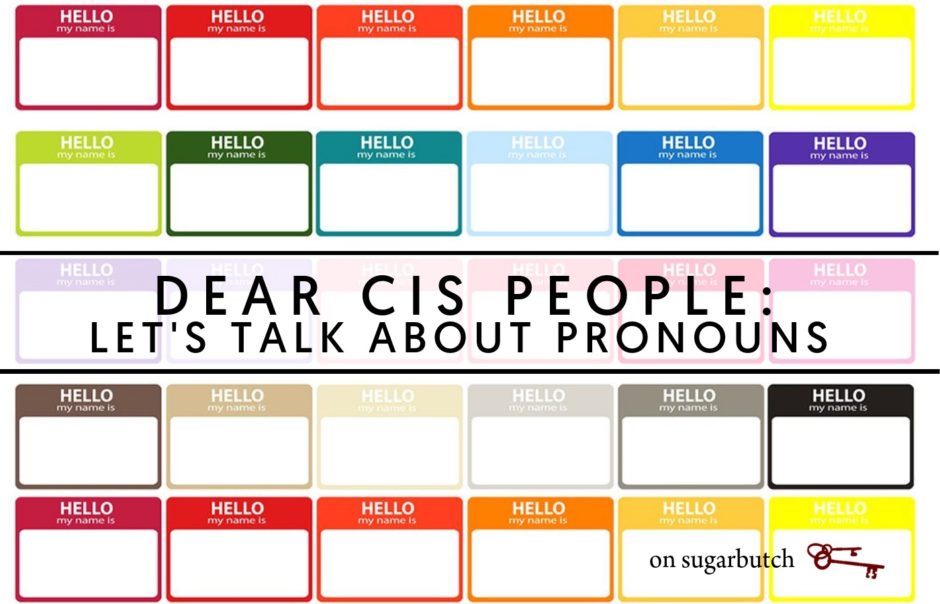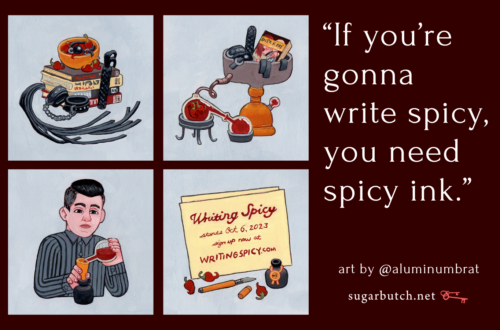This site contains explicit writings on kink practices, dominant/submissive relationships, and queer kink erotica (among other things). All characters in role play or non-consent scenes are consenting adults. Content warnings are included.
Dear cis people who put your pronouns on your “hello my name is” name tags:
Thank you.
When you do that, I feel more comfortable putting my pronouns — they/them. I feel more comfortable being visibly out as nonbinary. I feel more comfortable asking people to use the pronouns that feel most like me, that make me feel most seen and whole, instead of just resolving to be mis-gendered and mis-represented and whatever who cares anyway.
(Maybe I do, somewhere, a little.)
When we’re doing the socializing part of whatever event we’re at, and we are introduced, I automatically feel warmer toward you — regardless of your gender or presentation. I feel much more comfortable talking to you, because you already tell me you know a little about gender.
Thank you.
It is an ongoing cultural struggle right now to break our eyes open to more than the two binary gender roles. We are all still learning. Nonbinary and trans folks are still evolving the language and culture, and educators are still figuring out the best ways to communicate the theory and compassion. It’s a challenge to undo the cultural systems that have been normalized all our lives.
And yet, we must. If we want to support everyone to live their best lives, we must. If we want to be honoring of everyone, we must.
Other great places to include your pronouns:
- Your email signature. Example: “Sinclair Sexsmith¶ Pronouns: they, them, theirs, themself¶ sinclair@sugarbutch.net | @mrsexsmith | Facebook | Patreon”
- Social media bio, on Twitter or Facebook or etc. Example: “Writer. White non-binary butch feminist dominant. They/them.” You could also periodically put a post up on your social media, “Just for the record, I use they/them pronouns. Also, I grew up in Alaska, my favorite flower is red gerbera daisies and my favorite number is 12.”
- Regular bio, if you’re a performer, writer, teacher of some sort and you have a bio you send around, include them there! Example: “Sinclair Sexsmith (they/them) is a writer and queer nonbinary butch dominant.”
- Introductions at a meeting or workshop, if they say “Go around & say your names.” They don’t have to invite you to include your pronoun in your intro in order to include it! Example: “I’m Sinclair, I use they/them pronouns.”
- Any time you’re speaking in front of a group! Example: “Hi! I’m excited to have you at this poetry reading today, thanks for coming to the Bluestockings Bookstore. I’m Sinclair, I use they/them pronouns — but you probably already know that, since you’re here!”
- Can you think of other places I haven’t listed here? I’m sure there are others. Leave ’em in the comments!
If you don’t know someone’s pronouns, ask!
This is an important skill to cultivate. We have probably all heard this, but there are plenty of times we — all of us, myself included — feel awkward asking, and so we don’t. But it’s never too late — ask at any point during the conversation.
It’s not a faux pas if you have to stop in the middle of a sentence, just ask.
“Sorry, what are your pronouns?”
“Oh I didn’t get your pronouns, what are they?”
“Will you remind me your pronouns please?”
If you mess up, no big deal. We all do.
You’re not a bad person if you mess it up. You’re not a bad ally, or a bad person. You’re practicing. Maybe you got the wrong info, or maybe that person just changed their pronouns.
Just start again.
The #1 thing to remember: don’t make it about you. Apologize, move on, try again.
“The other day, she — “
“They use they pronouns.”
“Oh, they. Okay. The other day, they …”
That thing where people say, “Omigod, I’m SO sorry! I really care about pronouns! I’m trying so hard! I’m not used to it! Forgive me!!!!” — that makes it such a bigger deal than it is. Treat it like mispronouncing someone’s name — it’s a little disrespectful, so be sure to be sensitive, but it’s ultimately no big deal.
Just acknowledge, apologize, have a redo, and do better in the future.
It gets easier with practice & time.
You’ll get it. Keep at it. Practice saying and expressing your pronouns whenever you can. Practice asking. The more cis people can ask and practice with each other, the more of the burden it takes off of trans and nonbinary folks to do the education work themselves.
There’s one more thing I want you to know:
It feels so good when people get it right.
It can make my whole day brighter when I hear someone use they/them pronouns.
Honestly, I rarely hear it myself, because if I’m standing there, it’s the least likely place for someone to refer to me in the third person. But sometimes it happens in an introduction, or a story. And it still surprises me sometimes.
I feel vulnerable, and cared for, and seen.





Good article. Just had one suggestion – the article is addressed to cis people; its main thrust is to encourage cis people to write/say *their* preferred pronouns. And the section ‘Other great places to include your pronouns’, provides 5 hypothetical situations as helpful examples. But in each you use yourself in the example. The whole point of this article is that even though I’m a cis female, I should nonetheless say “I’m Nicole, I use she/her pronouns”. So I think it’d be good to include some cis examples.
That was going to be my suggestion too.
Your email signature. Example: “Bubba Jones¶ Pronouns: he, him, his, himself¶ bubba@jonestothemoonby2016.info | @jonestothemoon | Facebook | Patreon |Twitter”
(This is TOTALLY made up, I would be surprised to learn that jonestothemoon is a real thing, but if it is, it’s merely coincidental. There probably is at least a thousand Bubba Jones’s out there. This has nothing to do with any of them.)
As a college faculty member I would flesh out your suggestion that teachers include pronouns with their bios. My suggestion is we add it to our syllabi. :)
I know instructors who do this.
As a trans woman who may or may not pass depending on the crowd or my presentation (sometimes a neutral T-shirt is what I’m in the mood for and that’s all people need to see to misgender me in spite of the purse I’m carrying)… if introductions have started without pronouns I feel like it would be awkward to inject mine before someone else did, but I would want to make sure people use my correct pronouns. any suggestion on how to handle that?
Thank you! However, I will add that pronouns CAN be a very big deal. I have been introduced with incorrect pronouns to a full crowd just before a talk. This was a HUGE deal for me and I felt like crap. Our experiences are often different and I am personally very sensitive about it. I think it’s mostly because I am fed up.
This is beautiful! Thank you for posting this – I’m excited to share it with more folks <3
Great piece! Quick suggestion add, having pronouns on business cards :-)
The biggest obstacle I face is habit. Decades of having mom (or one of her sisters) correct my pronoun usage – nothing malevolent intended, but hard to unlearn.
My question is this: you use mrsexsmith as your twitter handle, but what are the options for honorifics? I’m old enough to remember how controversial Ms. was when introduced, and that was about the relatively simple (yeah, right) issue of whether or not a woman’s marital status is anyone else’s concern. Do we have only Mr. Mrs. and Ms.? Surely that must limit too many people.
My understanding is that Mx. is an emerging honorific that is gender neutral. https://www.merriam-webster.com/words-at-play/mx-gender-neutral-title
My understanding is that Mx. is an emerging honorific to avoid misgendering individuals or assuming pronouns. https://www.merriam-webster.com/words-at-play/mx-gender-neutral-title
Thank you for sharing this wonderful article! I found it to be very informative and enlightening. And just to piggyback off what some of the others have mentioned about the pronouns. I think adding them on the syllabi, business cards and our signatures on our emails are great ideas!!
So in closing, I want to let you know that I took your advice and created a post on a social media platform which included my pronouns. Thanks for the many great takeaways!
Preferred Pronouns on Everything:
It seems that there is a consensus that pronouns (of both cis and nonbinary) people need to be displayed everywhere no matter the context. I’m a queer science fiction writer, but I don’t think it is necessary whatsoever to let people know of my sexuality in my bio any more than it is necessary to let them know what my favorite television show is. Both are part of who I am, but neither are relevant to my writing (unless I write about gender, which I don’t). It makes me feel weird when others insist on telling me information about their sexuality when I feel it is unrelated to the matter at hand.
Preferred Pronouns in Classrooms:
My best friend is cis, and in our college most semesters begin with everyone sharing their name and pronouns. She feels odd being asked to tell people her binary gender because to her it’s obvious, and feels that it’s a waste of time having everyone go because 95% of people of our class is the gender they appear. She thinks that everyone could be called They and that’d be a perfect solution. I agree with her for the most part. I think there comes a point where you can live without people’s approval. I’m not saying everyone should, but I guess that I applaud those whose day isn’t in emotional tatters if enough people mislabeled them.
And that’s pretty much the definition of cis privilege in a comment.
I’d love to share this article professionally. However, the references to sex/dominance/submission are not something I can share within my profession.
The version on Medium is more professional: https://medium.com/@mrsexsmith/dear-cis-people-who-put-your-pronouns-on-your-hello-my-name-is-nametags-78c047ed7af1
I remember getting so angry when a supervisor of ours continually ignored a co-workers preferred pronouns. They introduced themself, “I’m Sam and I use they/them pronouns” then he called them “she” at least 6 times throughout the same meeting even after another co-worker reminded him that Sam uses they/them.
Some people are just assholes and are choosing not to use correct pronouns because they think you should use the pronouns of the sex (they assume) you were born with.
Video conferencing: I saw someone add their pronouns after their first name so it displays under their pic/video, so I dug around in the settings to change my own. Now every time I use (Zoom) my pronouns are there.
I’m also a professor and use pronouns after my name to draw attention to the fact that I’m openly transgender, for both students and faculty. Everyone using pronouns in a similar fashion would negate some of the context the pronoun use creates. Also, several non-binary peers have requested “what pronouns do you use?” Above some of the other dialog phrases suggested by the author. Ending on a positive note…I found the theme of the article to be both kind and sensitive to the billions of cisgender people in the world while adding some ideas for positive habit building. Well done.
No one really cares. Most people aren’t going to care, nor are they going to remember. This is your issue. If you look like and talk like a man – they’ll call you he/dude. Simple as that. That’s not their fault.
Late reply, but it’s not all-or-nothing. I am a trans person and I use he/him/his, but most people who encounter me will use the wrong pronouns. Often, people in my life who know I am trans will use the wrong pronouns by mistake.
To be frank, it is a painful and humiliating experience. However, I do take on the responsibility for managing these feelings. For example, I try my hardest not to lash out at people who mess up, regardless of how much it hurts.
This is actually a very common experience, because wanting to be treated as a certain gender is an element of gender dysphoria. (In fact, it is one of the criteria the APA uses to diagnose gender dysphoria.)
So, when we get treated as the wrong gender, it is very common for people to feel distress. I get that this is “weird” and inconvenient given our current system, but nobody asks to feel gender dysphoria.
I try to go about expressing my gender in a way that doesn’t hurt anybody, hence I strive to treat people with politeness even when they’ve done something hurtful. I feel this is a responsibility I have to my fellow humans.
But it doesn’t make me “fragile” that I want to live openly as trans, and it doesn’t foreclose the possibility of taking responsibility for my feelings.
It is, of course, no one person’s fault that I experience dysphoria. But it is especially difficult to live in a world where gender dysphoria as something that Very Sensitive, Shrill people bring into the public sphere, which I feel your comment about “spending one’s day in emotional tatters” implies.
No, I would say that if I’m persistently causing someone in my life distress related to gender dysphoria, I care about that. Do you not care when you cause other people distress? That’s interesting.
Really, “nobody cares + shut up about your pain” isn’t a moral argument. And it’s implicitly privileging your feelings above other people’s well-being, without explaining why we should do so.
Nobody cares that you don’t care.